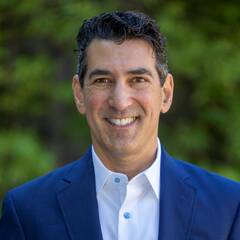living the good life
09/25/2023 04:23:47 PM

Living the Good Life: Making Room for Awe
Sermon, Kol Nidre 5784
September 25, 2023
In September, 2014, to celebrate my fiftieth birthday, my wife, Sandra, who knows me really, really well, took me to a concert at Davies Symphony Hall in San Francisco. She bought center orchestra seats and she treated me to the most emotionally rich musical experience of my life. This wasn’t just any performance; it was my favorite musician, Brian Wilson, and his band. From the time I was probably six years old, I’ve been moved to the core by Brian Wilson’s music and the spirit of the songs of the Beach Boys. Hearing his music, seeing him behind a grand piano in that beautiful venue, singing the tunes that have formed the soundtrack of my life, while sitting with the love of my life, was a peak experience. I got goosebumps, I felt full of both joy and peace, and I felt totally complete.
This was more than a fun night out. That night, I experienced what scientists would describe as awe. Dacher Keltner, a professor of psychology at UC Berkeley and founder of its Greater Good Science Center, published a book this year called Awe. The author, an expert on the teaching of happiness, seeks “an answer to a perennial question, one we have been asking in different ways for tens of thousands of years: How can we live the good life?” For him that means a life enlivened by joy and community and meaning. But even more, such a life brings a sense of worth and belonging and strengthens the people and natural environments in which we live. After twenty years of teaching and researching happiness, his answer is to find awe. “Awe,” he explains, “is the emotion we experience when we encounter vast mysteries that we don’t understand.”
And as I delved into this concept, I came to recognize that awe is a complex word. In English, its etymology traces back to the eighth century as a word for fear and dread. In fact, many of us here tonight probably first knew of the sense of awe in this more frightening, heavier way. When I was a teenager, what little I knew about the meaning of the word awe was what I associated with the machzor for the High Holy Days and these words: “who shall live and who shall die; who shall see ripe age and who shall not.” That’s definitely awe in the fear and dread sense. If we are going to find awe in 2023, we might begin by understanding its meaning in a fuller way.
Looking in a modern Hebrew-English dictionary, we would find five different Hebrew words for "fear,” and there are subtle differences in the various words. One example is the word “pachad,” which is best translated as "terror" or "trembling" and is associated with forceful events, wrath, or rage. “Yira,” on the other hand, is associated with an experience with the Divine. We might translate it as “fear” or “reverence.” And it is the word “yira,” which is connected to the Hebrew word for awe, “nora.” Both “yira” and “nora” come from the Hebrew root yod, reish, alef. And it makes good sense that we would associate an overwhelming sense of awe with an experience of the Divine.
When our biblical patriarch Jacob awakens from his dream of a ladder connecting heaven and earth, with angels going up and down, and God standing above it, Jacob exclaims, “Vayira vayomar, mah nora hamakom hazeh.” He was awestruck and said, “How awe-inspiring is this place!” In the midst of his vulnerability, he is filled with a sense of awe and wonder. The border between fear and awe may be a thin one, but it’s significant.
And in our tradition, awe and wisdom are also interconnected. In the Talmud we read, “Where there is no wisdom, there is no awe. Where there is no awe, there is no wisdom.” Why? Because our sages from around two thousand years ago, thought that awe was part of the religious experience, leading to greater enlightenment.
Dr. Keltner describes awe in a way that really resonates with me. He said awe is: “a self transcendent emotion, an emotion that takes you away from the self.” Those of us who were here on Rosh Hashanah heard me speak about both the difficult uncertainty of the times we are living in and the need for elevating kindness in our lives, community, and society. This brings us back to the need for awe, because awe takes us out of our self centeredness.
In the podcast Hidden Brain, Dr. Keltner explains, “The self takes up a lot of area in the brain and our consciousness. We're always thinking, especially in this modern world about my goals, my status, my aspirations, what I'm doing, it's my desires, my interests. And evolutionists have really talked about the problem of self-interest. How do we get people to orient to other people, to societies and collectives? And we started to have this idea that awe does that by creating the small self.”
This notion of the “small self” is one we all might find familiar from Ralph Waldo Emerson, who famously wrote: “I am nothing.”
Doesn’t that sound like the antithesis of the “I am everything” culture we find ourselves living in? Embracing our small selves, understanding our relationship to nature and the bigger world, is awe. And awe, which we Jews have embraced for years, is big right now. “Awe is on the cutting edge” of emotion research,” says Judith Moskowitz, professor at Northwestern University Feinberg School of Medicine. Dr. Moskowitz writes that “intentional awe experiences, like walks in nature, collective movement, like dance or ceremony . . . improve psychological well-being.”
While we might think we need to have a monumental experience, like scaling a mountain or traveling to a faraway place, the beauty of awe is that we can find it anywhere. It doesn’t have to require money or even a large investment of time. Just a couple of minutes a day can take us there. It turns out we have a basic need for awe hard wired into our brains and bodies, so all we have to do is take a minute and wonder, or let ourselves be fully present in the moment.
I felt awe as I stood next to Cantor Kliger as he was leading the opening songs Erev Rosh Hashanah. The smiles and sense of peace on the faces of those in this sacred space gave me a transcendent feeling of communion and of being part of something special and holy. I also felt it two days later at Rockaway Beach at our Tashlich service, when we all took a moment for silent prayer and gazed out at the ocean and mountains.
And I have had many, many pastoral moments with you that have filled me with awe. As I sat on the edge of the bed of a Holocaust survivor who was at the very end of her life, I was fully prepared that she was no longer responsive. So I’ll never forget how she opened her eyes as I sang Sh’ma. I knew that something transcendent had just happened as she reacted to the words of our tradition that I was honored to vocalize for her.
To the theologian Abraham Heschel, a life of spirit begins with awe. He wrote: “The meaning of awe is to realize that life takes place under wide horizons . . . Awe enables us to perceive in the world intimations of the divine, to sense in small things the beginning of infinite experience, to sense the ultimate in the common and the simple; to feel in the rush of the passing the stillness of the eternal”
I would say doing so takes an ability to fine tune our focus so that we can sense the infinite from something small and sense the ultimate in something simple. It takes presence of mind and a certain suppleness of the spirit. And it is attainable.
We humans are social beings, and awe is the ultimate collective emotion. It inspires altruism and motivates people to do things that enhance the greater good. Awe helps bind us to others and motivates us to act in collaborative ways—including religious gatherings and worship—that enable strong groups and cohesive communities.
So, if our theme for this year here at PTS is chesed or kindness, I can’t think of a better tool for each of us to embrace than finding awe as a way to take us outside ourselves and better focus us in our shared humanity and sense of religious community.
Many days, I experience a sense of awe in the little everyday parts of my job. It might come in the form of a wide smile on the face of a student in our youth education program who for the first time catches the football I playfully toss their way or in the beauty of a d’var Torah that one of my colleagues offers at a staff meeting. What we bring to and give to each other—big and small—those can become moments of awe. And that awe always makes me feel part of something bigger than myself.
Tonight, you all are a source of awe. Take a moment to look around this sanctuary. In an uncertain world, Jews around the globe have gathered tonight to pray, sing, and be together. I am awestruck at the power in that, the beauty in that, and in the blessings of community. May we take a moment each day to find and cherish moments of awe. And may those moments help us grow in our commitment to each other.
Cain y’hi ratzon, so may this be God’s will
---------------------
Footnotes forthcoming.






